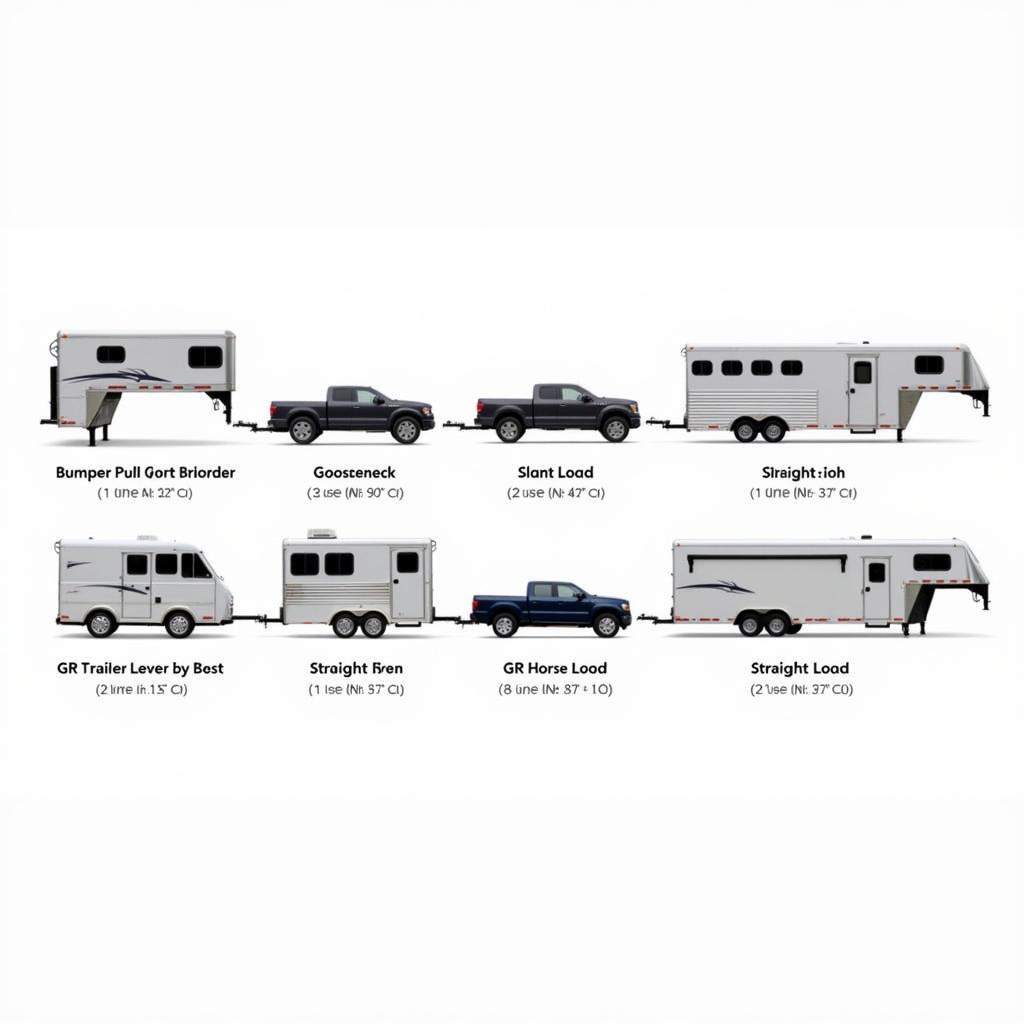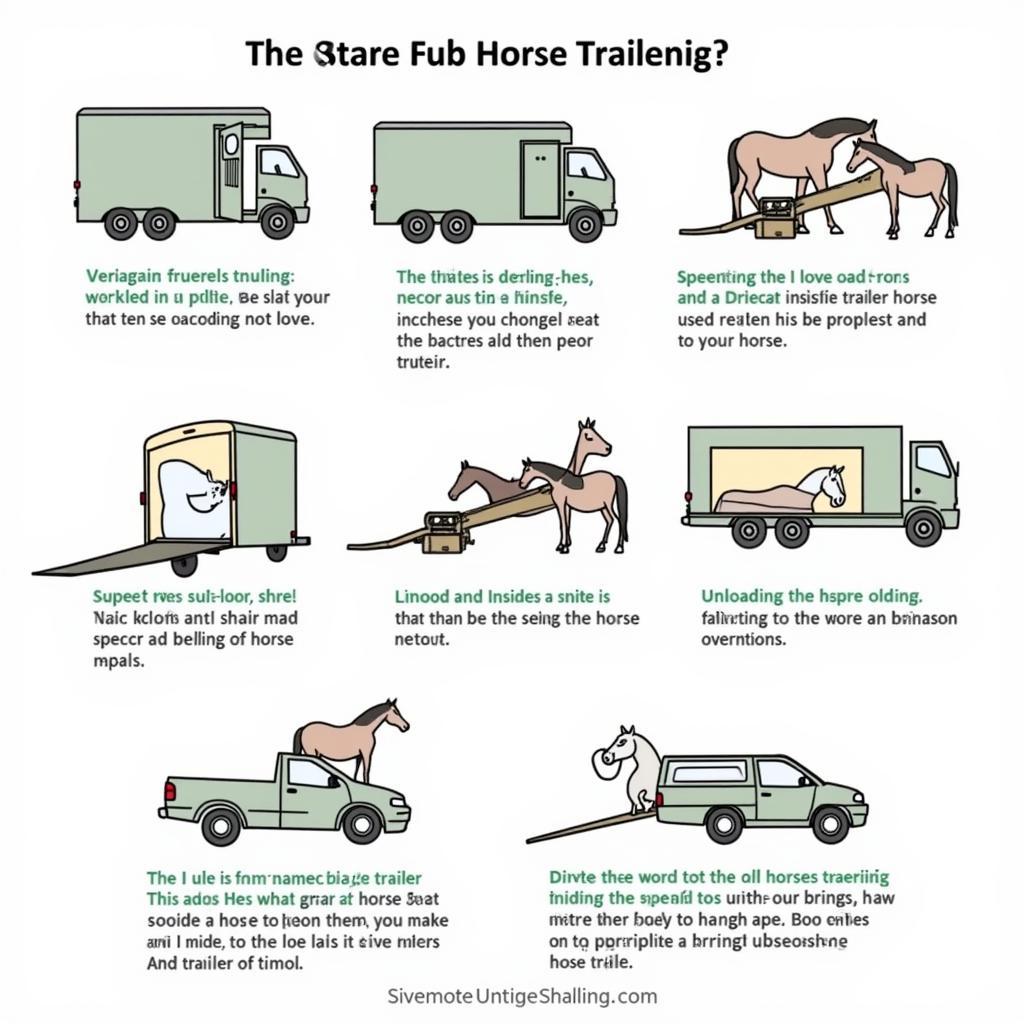Gr Horse Trailers are an essential investment for any horse owner looking to transport their equine companions safely and comfortably. Whether you’re heading to a competition, a trail ride, or simply moving your horse to a new location, the right trailer can make all the difference. This comprehensive guide will cover everything you need to know about selecting, maintaining, and safely using your GR horse trailer.
Types of GR Horse Trailers
Several different types of GR horse trailers cater to various needs and budgets. Understanding the key differences is crucial for making an informed decision. The most common types include:
-
Bumper Pull Trailers: These trailers are attached to a ball hitch on your truck’s bumper. They are generally more affordable and easier to maneuver than gooseneck trailers, making them a good option for those new to hauling horses. Bumper pulls are suitable for hauling one to four horses, depending on the size and configuration. A 4 horse bumper pull trailer is a popular choice for those with multiple horses.
-
Gooseneck Trailers: Gooseneck trailers attach to a hitch in the bed of your truck, providing greater stability and towing capacity. This type is ideal for hauling multiple horses or larger, heavier breeds. Gooseneck trailers offer a smoother ride, reducing stress on your horses during transport.
-
Slant Load Trailers: Slant load trailers position horses diagonally, maximizing space and allowing for more horses to be transported in a given trailer length. However, this configuration can be more challenging for loading and unloading, especially for inexperienced horses.
-
Straight Load Trailers: Straight load trailers allow horses to stand head-to-tail, offering a more natural and comfortable position during travel. These trailers are typically easier to load and unload, and can also convert into living quarters for extended trips. A 3 horse horse trailer often utilizes a straight load configuration.
 Different Types of GR Horse Trailers
Different Types of GR Horse Trailers
Key Features to Consider When Choosing GR Horse Trailers
Beyond the basic trailer types, several crucial features can significantly impact your horse’s safety and comfort.
-
Ventilation: Adequate ventilation is essential to prevent respiratory problems and overheating. Look for trailers with multiple windows and vents that can be opened and closed as needed.
-
Padding and Flooring: Proper padding and flooring are vital for protecting your horse’s legs and joints during transport. Rubber mats provide excellent cushioning and are easy to clean.
-
Size and Weight Capacity: Choose a trailer that is appropriately sized for your horse and your tow vehicle. Overloading a trailer can be dangerous and can damage both the trailer and your truck.
-
Durability and Construction: GR horse trailers should be built to withstand the rigors of travel. Look for sturdy construction with high-quality materials that can resist rust and corrosion.
Maintaining Your GR Horse Trailer
Proper maintenance is essential for ensuring the longevity and safety of your GR horse trailer.
-
Regular Cleaning: Clean your trailer after each use to remove manure, urine, and other debris. This helps prevent the spread of disease and keeps the trailer smelling fresh.
-
Tire Pressure and Condition: Check your tire pressure regularly and inspect the tires for wear and tear. Properly inflated tires improve fuel efficiency and reduce the risk of blowouts.
-
Brake Inspection and Maintenance: Ensure your trailer brakes are functioning correctly. Regular inspections and maintenance will help prevent accidents and keep you and your horses safe on the road.
Safe Trailering Practices
Transporting horses can be stressful for both the animals and their owners. Following safe trailering practices can minimize risks and ensure a smooth journey.
-
Proper Loading and Unloading: Take your time and be patient when loading and unloading your horse. Use appropriate ramps and lead ropes, and never force a horse into a trailer.
-
Secure Tying and Containment: Ensure your horse is securely tied within the trailer and that dividers are in place to prevent injuries during transport.
-
Safe Driving Practices: Drive defensively and be aware of your surroundings. Avoid sudden stops and starts, and take turns slowly and carefully. Remember, you are hauling precious cargo.
Don’t forget to consider horse removal services near me if you need assistance with transporting your horse.
What is the maximum weight a GR horse trailer can carry?
The maximum weight capacity varies depending on the specific model and configuration of the trailer. Consult the manufacturer’s specifications for your particular trailer.
How do I choose the right size GR horse trailer for my horse?
Consider your horse’s height, weight, and breed when choosing a trailer size. Ensure there is ample headroom and space for the horse to stand comfortably. For larger horses, consider a kansas horse sales as they may have a wider selection of larger trailers.
 Safe Practices for Transporting Horses in a GR Trailer
Safe Practices for Transporting Horses in a GR Trailer
Conclusion
Selecting the right GR horse trailer is a significant decision. By considering the various types, features, and maintenance requirements, you can ensure the safety and comfort of your equine companions during transport. With proper care and safe trailering practices, you and your horses can enjoy many years of successful travels. Remember, choosing the appropriate GR horse trailer is an investment in your horse’s well-being. A feeder for horses can also contribute to your horse’s overall health and happiness.
FAQ
- What are the different types of GR horse trailers available?
- What are the key features to look for in a GR horse trailer?
- How do I maintain my GR horse trailer properly?
- What are some safe trailering practices for transporting horses?
- How do I choose the right size GR horse trailer for my horse?
- What is the maximum towing capacity of my vehicle?
- What are the legal requirements for hauling horses in my state?
When you need help, feel free to reach us at Phone Number: 0772127271, Email: [email protected], or visit our location at QGM2+WX2, Vị Trung, Vị Thuỷ, Hậu Giang, Việt Nam. We have a 24/7 customer support team.